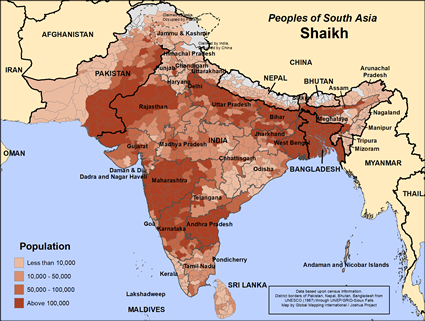Shaikh in Nepal

Photo Source:
Mikhail Nilov - Pexels
|

Map Source:
People Group Location: Omid. Other geography / data: GMI. Map Design: Joshua Project
|
| People Name: | Shaikh |
| Country: | Nepal |
| 10/40 Window: | Yes |
| Population: | 851,000 |
| World Population: | 118,410,400 |
| Primary Language: | Urdu |
| Primary Religion: | Islam |
| Christian Adherents: | 0.00 % |
| Evangelicals: | 0.00 % |
| Scripture: | Complete Bible |
| Ministry Resources: | Yes |
| Jesus Film: | Yes |
| Audio Recordings: | Yes |
| People Cluster: | South Asia Muslim - Shaikh |
| Affinity Bloc: | South Asian Peoples |
| Progress Level: |
|
Introduction / History
The term Shaikh is used for a sociocultural group that originated with Arab settlers in South Asia, which now includes many subgroups. Islam arrived in the area now known as Pakistan in 711 AD when a Muslim Arab army conquered the northwestern part of the Indus Valley from Jammu and Kashmir to the Arabian Sea. Technocrats, bureaucrats, soldiers, traders, scientists, architects, teachers, theologians, and Sufis flocked from the rest of the Arab and Muslim world to the Islamic Sultanate in South Asia, settling there permanently. The descendants of these Arabs usually go by the title of Shaikh and are also known in Pakistan as Muslim Khatri. In Nepal, Shaikhs are most likely to live in the southern and eastern regions.
What Are Their Lives Like?
The large South Asian caste of Shaikhs is not bound by one particular profession. The Shaikh can be broadly grouped into five communities. The majority of the Punjabi Shaikhs are urbanized and detached from their traditional agricultural ancestry. Common surnames are Mondal, Siddiqui, Usmani, Faroqui, and Sheikh.The Shaikhs marry within their group. Marriage to one spouse is the norm, but a man may marry more wives if he can afford them. Sons inherit property. Though there are often love marriages in urban areas, family-oriented arranged marriages are most common among Bengali Muslims in Nepal. It begins with a matchmaker who approaches both families to ensure the couple is compatible. No unemployed man is acceptable as a groom. Family elders handle the formalities for the engagement. A Bengali Muslim wedding ceremony can take up to three days.
What Are Their Beliefs?
Bengali Muslims seek help from pirs, Muslim saints, they believe carry special powers even after they die. They also commonly embrace Sufism. This is a mystical and emotional Islamic practice that seeks to reach a state of spiritual purity.
What Are Their Needs?
Christ's ambassadors can point out that those who pray to Jesus Christ will always be heard, and he will always answer. Some Sufis are seeking an emotional connection with the one true God, which they can find through the Lord of lords.
Prayer Points
Pray for the Holy Spirit to move in Bengali Muslim families, giving them spiritual hunger.Pray for loving and dedicated workers to go to them in Nepal, showing the way to the cross.Pray that the movement to Christ among Bengali Muslims in Bangladesh will extend to Nepal.